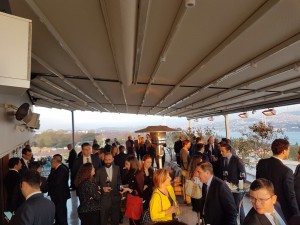 A key component of networking strategically when networking internationally is cultural awareness. Cultural awareness impacts “with whom” and “how” business professionals need to network to succeed in their international endeavors. According to the Global Mindset® research, building networks across cultures and with influential individuals is a key global leadership attribute that helps build trust across cultures.
A key component of networking strategically when networking internationally is cultural awareness. Cultural awareness impacts “with whom” and “how” business professionals need to network to succeed in their international endeavors. According to the Global Mindset® research, building networks across cultures and with influential individuals is a key global leadership attribute that helps build trust across cultures.
Below are tips for four strategic areas that will help you enjoy building your productive international relationships.
Self-awareness: Ask yourself if you feel good at networking in your home country. How do you measure success? What would you recommend others if they needed advice about how to build strong networks in your country? Then, notice how some key shared beliefs and values, in other words the culture, in your country influence this advice. Let this then trigger your curiosity about how networks are built in other countries.
The role of culture in building trust: Considering some measurable outcomes of networking are gaining critical information and new relationships, understanding the role of culture in building trust will help you increase the effectiveness of your networking.
Culture impacts the process in multiple ways. One, it impacts “whom to network with.” Studying the work of thought leaders like Geert Hofstede or utilizing tools like GlobeSmart give great insight into the key aspects of cultures that affect business practices including relationship building. Why for instance may it be possible to build immediate relationships at a networking event in one country and why introductions are crucial in another? Two, it impacts “how to network.” While the information above will also shed light on how to network across cultures another great resource is The Culture Map, a book authored by Erin Meyer, where she differentiates between cognitive Vs. affective trust building.
Networking with cultural awareness will help you connect emotionally and develop productive relationships when the networking activity takes place.
Networking goals across cultures: There is much overlap between setting goals in a homogeneous culture and heterogeneous culture situations. However, it is important to keep in mind that networking across cultures can take more or less time than in networking situations you may be used to. There may also be long standing or temporary adverse outlooks on your business topic or country of origin. Mutual understanding and respect go a long way. Discuss networking in a specific culture with other more experienced professionals. Experience exchange is a great way of learning and a great practice for future networking.
Influential contacts and organizations: Start with people you already know. Put your cultural awareness into action, and decide whom or which organizations you need to network with, and how. Keep in mind that organizations that may be recommended for networking can include national and local governments you are not used to liaising with in your home country. Last but not least, mutually helpful discussions are best for productive relationships.
Once you have prepared yourself mentally and emotionally for communicating across cultures, “practiced” different communication approaches (yes, especially in-person networking can benefit greatly from practice), set your networking goals, identified your key networks and set aside networking time on your schedule start networking away and enjoy networking across cultures. This is one of the activities that will move you closer to your business goals.
Stay tuned for more networking insights from experts and professionals working in the international/global field in the near future.
